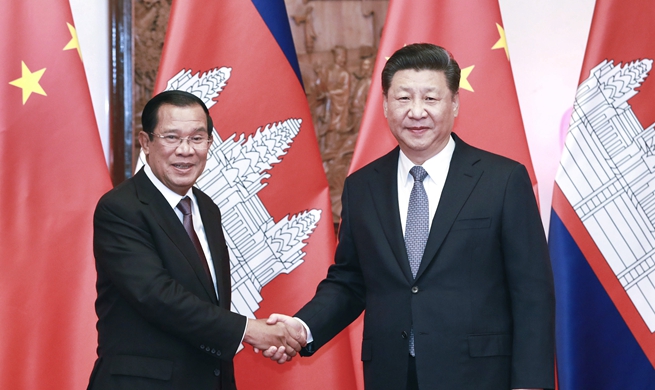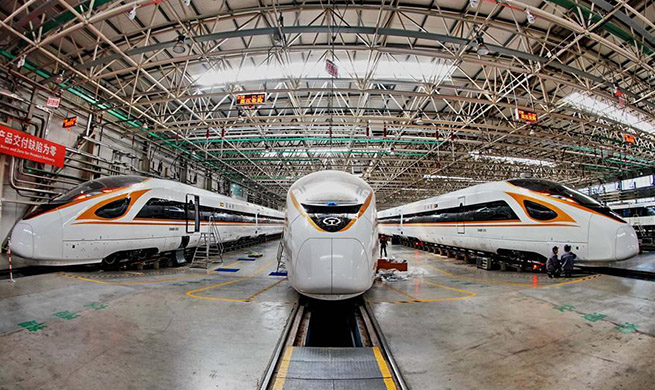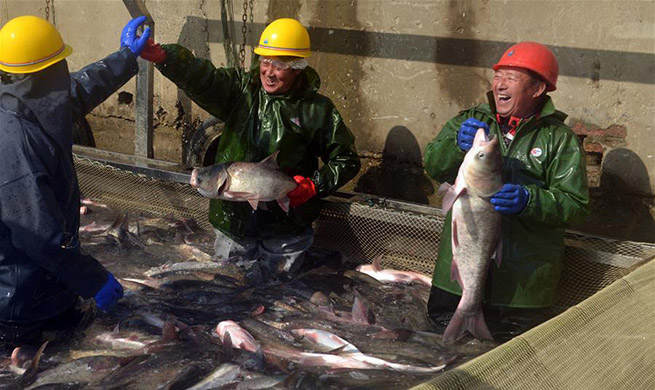SHENYANG, Jan. 22 (Xinhua) -- At a construction site in freezing winter, government official Shi Wei joins workers laying and burying cables underground for an aluminium company worth billions of yuan.
Shi, with the industry and information technology department in the city of Yingkou, northeast China's Liaoning Province, has been assigned as "steward" of the project since 2017, responsible for coordination with departments connected to the project.
The company is the largest aluminium production project in Yingkou. Over the past two years, Shi has traveled extensively to help solve the power supply problem that is increasingly pressing as the company expands.
"I have visited multiple power plants in the cities of Shenyang and Dalian, and even those in Inner Mongolia Autonomous Region to ensure power supply," he said.
Thanks to the direct connection he has managed to establish with the power plants, they have offered the company power for lower than market price.
"Our annual power consumption currently reaches 6 billion kWh, and Shi's endeavor has saved us 300 million yuan (44 million U.S. dollars) every year," said Zhang Hui, general manager of the company.
Project stewards are government coordinators designated for major projects in Liaoning Province. Each steward provides a one-on-one service to a particular project, helping to clear obstacles.
In 2018, 6,000 projects were allocated stewards from various government departments, and this year, all projects with annual operation revenue of 20 million yuan or above will have such stewards.
Northeast China -- made up of Liaoning, Jilin and Heilongjiang provinces -- was among the first regions in China to become industrialized relying on heavy industries.
However, the region was also known for its daunting business environment, largely because of high costs and low efficiency caused by government bureaucracy under the long-term influence of a planned economy.
According to a popular saying, "investment does not go beyond Shanhaiguan Pass," referring to a traditional geographical division separating the northeastern region from the rest of China.
While traditional heavy industries have lost their shine, local governments in northeast China are reforming to streamline administrations and improve services to vie for private businesses.
Last week, Heilongjiang provincial legislature passed a regulation to improve the business environment. The regulation, which will take effect on March 1, ordered governments at county level and above to establish a service for business projects, designating government officials to track administrative application cases for businesses.
It also requested government departments to organize meetings with entrepreneurs, and stipulated that officials should attend seminars and annual meetings of companies and industrial associations to listen to their advice and help solve their problems.
In the reform to cut red tape, Jilin Province has scrapped more than 700 approval procedures after learning from the experience of more developed coastal provinces.
In Liaoning, a provincial business environment supervision department was established, a watchdog to ensure an open and fair business environment in the province.
According to a report on China business environment index released in November by the think tank Wanb Institute and the financial news website China Fortune Bond, Liaoning ranked ninth place for business environment in 2018, after Shanghai, Beijing and six coastal regions in China's 31 provincial-level regions.
Benefiting from the progress, Liaoning Province is expecting an economic growth of about 5.6 percent in 2018, up 1.4 percentage points on the growth in 2017.
"In the future, Liaoning should not only reinforce and develop its industries with traditional advantages but also vigorously develop the modern service industry and private sector," said Xie Di, dean of the school of economics of Liaoning University.

















